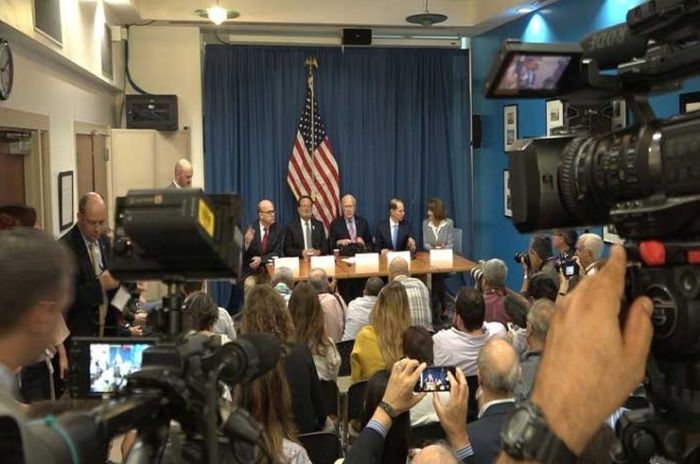
The Congress members also questioned the withdrawal of U.S. diplomats from the island and the expulsion of Cuban diplomats from the United States
U.S. Democratic Congress members who visited Cuba this week defended the approach both countries started late 2014 to advance to the normalization of relations.
The bipartisan delegation was formed by senators Patrick Leahy (Vermont), Ron Wyden (Oregon) and Gary Peters (Michigan) and representatives Jim McGovern (Massachusetts), Kathy Castor (Florida) and Susan Davis (California), who talked in this capital with authorities, including President Raul Castro, small businesspeople and other sectors of society.
In Cuba, legislators criticized the policy followed by president Donald Trump to the island, characterized since his arrival to the White House -in January, 2017- intent on intensifying the economic, commercial and financial blockade enacted over half a century ago and retreat from the progress achieved in 2015 and 2016.
Presidents Barack Obama and Raul Castro announced in December, 2014, a process of approach aimed at normalizing relations between Havana and Washington, which led to holding high-level meetings in both capitals and the signing of some twenty cooperation agreements.
During a press conference held Wednesday, at the closing of their visit, the Congress members led by Leahy called for maintaining that process and criticized Trump’s decision to boycott it.
They especially questioned the withdrawal of U.S. diplomats from the island and the expulsion of Cuban diplomats from the United States, using as a pretext alleged health incidents suffered by U.S. officials in this capital, described as sonic attacks by sectors ready to damage bilateral relations.
“How is anyone to obtain visa and maintain medical cooperation? What about students and agricultural projects? Asked Leahy, while McGovern lamented the policy towards Cuba be guided by “paranoia and suspicion”.
Regarding the incidents mentioned by U.S. diplomats, the senator for Vermont highlighted the cooperation of the Cuban government in search for the truth and assured that neither him nor his colleagues fear to come, because they know there is no danger at all.
The delegation was received on Monday by the Director General of the United States Office at the Ministry of Foreign Relations, Carlos Fernandez de Cossio, who repeated there is no evidence of sonic attacks against U.S. officials.
Cuba insists it did not allow nor will it permit in its territory any hostility toward foreign officials as part of its obligations derived from the Vienna Convention of 1961 on Diplomatic Relations.
Fernandez de Cossio also thanked visitors for their efforts to improve the links between the two neighboring countries.
On Tuesday, U.S. lawmakers talked with president Raul Castro, meeting that Leahy considered took place under an extremely frank and pleasant environment and served to confirm the desire on the Cuban part of continuing to improve relations, despite the present circumstances.
Besides the members of the Capitol, businesspeople, academics and citizens of the northern country reject the aggressiveness deployed against the Caribbean nation by Trump and some conservative voices.
 Escambray ENGLISH EDITION
Escambray ENGLISH EDITION





Escambray reserves the right to publish comments.